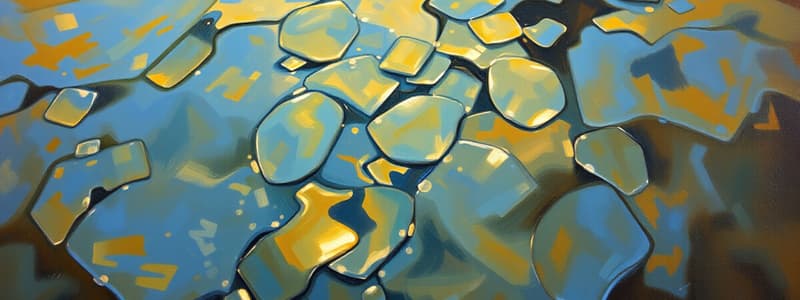Podcast
Questions and Answers
Which statements accurately describe convection in water? (Select all that apply)
Which statements accurately describe convection in water? (Select all that apply)
- Warm water rises because it is less dense than cold water. (correct)
- Cold water sinks because it is less dense than warm water.
- Warm water rises because it is more dense than cold water.
- Warm water sinks because it is less dense than cold water.
- Cold water sinks because it is more dense than warm water. (correct)
- Cold water rises because it is more dense than warm water.
Convection currents occur in fluids because of temperature and ________ differences.
Convection currents occur in fluids because of temperature and ________ differences.
density
Convection currents transfer ________ energy throughout a fluid.
Convection currents transfer ________ energy throughout a fluid.
thermal
In which layer of Earth's interior does convection occur?
In which layer of Earth's interior does convection occur?
How is thermal energy transferred during convection?
How is thermal energy transferred during convection?
When the temperature of a fluid increases, the kinetic energy of the molecules: ________.
When the temperature of a fluid increases, the kinetic energy of the molecules: ________.
As the temperature of a fluid increases, the speed of the molecules: ________.
As the temperature of a fluid increases, the speed of the molecules: ________.
As the temperature of a fluid increases, the density of the fluid: ________.
As the temperature of a fluid increases, the density of the fluid: ________.
As the temperature of a fluid increases, the fluid: ________.
As the temperature of a fluid increases, the fluid: ________.
Which statements best describe convection? (Select all that apply)
Which statements best describe convection? (Select all that apply)
Which describes the motion in a convection current?
Which describes the motion in a convection current?
In a lava lamp, what causes the waxy substance to rise? (Select all that apply)
In a lava lamp, what causes the waxy substance to rise? (Select all that apply)
What happens at night?
What happens at night?
Label A:
Label A:
Label B:
Label B:
Label C:
Label C:
Flashcards are hidden until you start studying
Study Notes
Convection Basics
- Convection is a process that occurs in liquids and gases due to temperature and density differences.
- Cold water sinks because it is denser than warm water, while warm water rises because it is less dense.
- Thermal energy is transferred through convection currents in fluids, continuing until temperature equalization occurs.
Convection Currents in Earth's Interior
- Convection occurs in the mantle of Earth's interior, playing a critical role in geological processes.
Mechanism of Thermal Energy Transfer
- Thermal energy is transferred by the movement of fluids, facilitating the circulation of heat.
- Convection involves circular motion, with warmer fluid rising and cooler fluid sinking.
Fluid Characteristics and Behavior
- As the temperature of a fluid increases, the kinetic energy and speed of its molecules rise, resulting in decreased density and causing the fluid to rise.
Descriptors of Convection
- Convection transfers thermal energy—not potential energy—and continues until the fluid reaches uniform temperature.
Real-world Examples
- In a lava lamp, a waxy substance rises because it is warm and less dense than the surrounding liquid, demonstrating convection in action.
Nighttime Air Movement
- At night, cool air over land moves offshore, demonstrating changes in air density and temperature.
Diagram Understanding
- Labels in a convection current diagram indicate:
- Cool fluid sinks
- Warm fluid rises
- The overall convection current pattern.
Studying That Suits You
Use AI to generate personalized quizzes and flashcards to suit your learning preferences.




